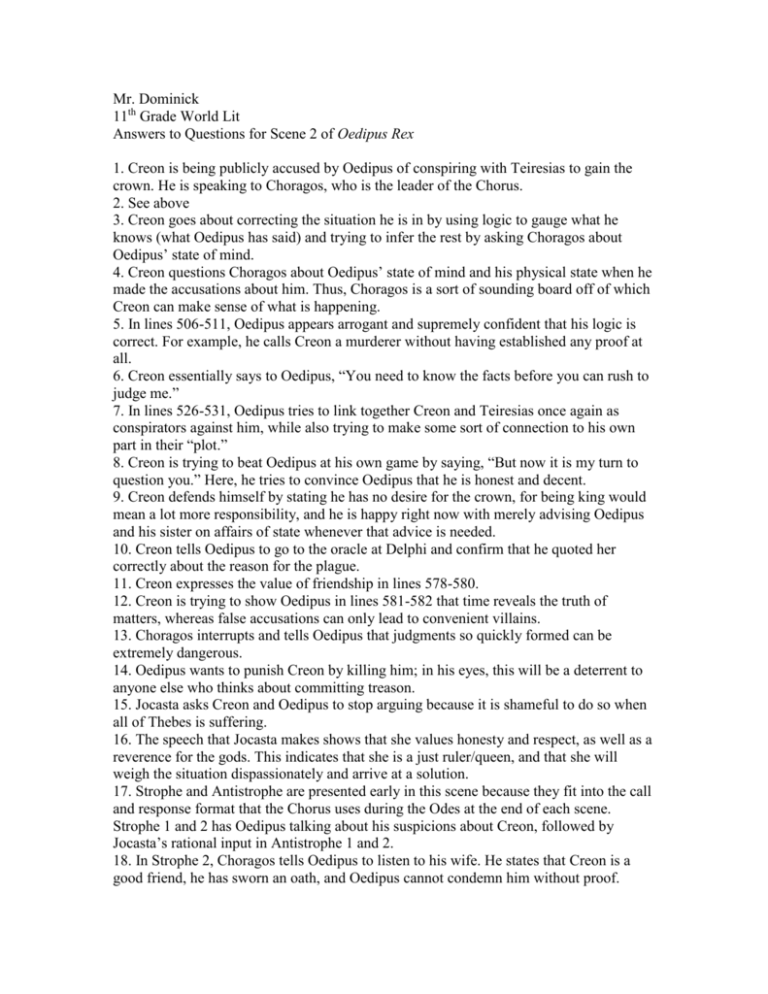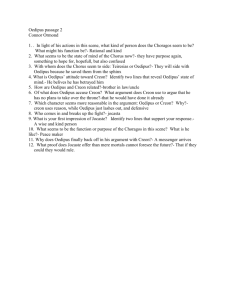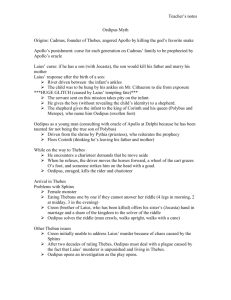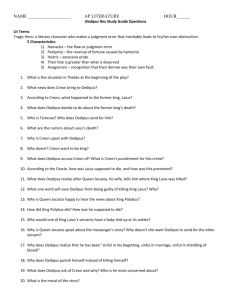Answers to Questions for Scene 2 of Oedipus Rex
advertisement

Mr. Dominick 11th Grade World Lit Answers to Questions for Scene 2 of Oedipus Rex 1. Creon is being publicly accused by Oedipus of conspiring with Teiresias to gain the crown. He is speaking to Choragos, who is the leader of the Chorus. 2. See above 3. Creon goes about correcting the situation he is in by using logic to gauge what he knows (what Oedipus has said) and trying to infer the rest by asking Choragos about Oedipus’ state of mind. 4. Creon questions Choragos about Oedipus’ state of mind and his physical state when he made the accusations about him. Thus, Choragos is a sort of sounding board off of which Creon can make sense of what is happening. 5. In lines 506-511, Oedipus appears arrogant and supremely confident that his logic is correct. For example, he calls Creon a murderer without having established any proof at all. 6. Creon essentially says to Oedipus, “You need to know the facts before you can rush to judge me.” 7. In lines 526-531, Oedipus tries to link together Creon and Teiresias once again as conspirators against him, while also trying to make some sort of connection to his own part in their “plot.” 8. Creon is trying to beat Oedipus at his own game by saying, “But now it is my turn to question you.” Here, he tries to convince Oedipus that he is honest and decent. 9. Creon defends himself by stating he has no desire for the crown, for being king would mean a lot more responsibility, and he is happy right now with merely advising Oedipus and his sister on affairs of state whenever that advice is needed. 10. Creon tells Oedipus to go to the oracle at Delphi and confirm that he quoted her correctly about the reason for the plague. 11. Creon expresses the value of friendship in lines 578-580. 12. Creon is trying to show Oedipus in lines 581-582 that time reveals the truth of matters, whereas false accusations can only lead to convenient villains. 13. Choragos interrupts and tells Oedipus that judgments so quickly formed can be extremely dangerous. 14. Oedipus wants to punish Creon by killing him; in his eyes, this will be a deterrent to anyone else who thinks about committing treason. 15. Jocasta asks Creon and Oedipus to stop arguing because it is shameful to do so when all of Thebes is suffering. 16. The speech that Jocasta makes shows that she values honesty and respect, as well as a reverence for the gods. This indicates that she is a just ruler/queen, and that she will weigh the situation dispassionately and arrive at a solution. 17. Strophe and Antistrophe are presented early in this scene because they fit into the call and response format that the Chorus uses during the Odes at the end of each scene. Strophe 1 and 2 has Oedipus talking about his suspicions about Creon, followed by Jocasta’s rational input in Antistrophe 1 and 2. 18. In Strophe 2, Choragos tells Oedipus to listen to his wife. He states that Creon is a good friend, he has sworn an oath, and Oedipus cannot condemn him without proof. 19. Choragos’ tone in lines 623-629 is reverent and humble. His references to the gods and his statement that the plague in Thebes has given him a “sick heart” show his tone. 20. Oedipus says that he is unsettled by Choragos’ unhappiness, and will therefore let Creon go for now. 21. In Antistrophe 1, the reader learns that Jocasta is persistent, patient, and methodical, as indicated by her questioning of Choragos. 22. The extended metaphor that used here is that Thebes is a ship on a turbulent sea. 23. Creon has not accused Oedipus of the murder of Laius at all; Oedipus’ tendency to jump to conclusions has made him think this because he believes Creon and Teiresias are colluding against him in order for Creon to claim the throne. 24. See next few questions 25. Laius is told by a soothsayer that his son will kill him. 26. Laius has one of his servants pierce his son’s ankles and leave him on a mountainside to die. 27. Jocasta shows that the prophecy about Laius’ son killing him did not come true. She means to show here that prophecies are worthless, and she is trying to dissuade Oedipus from putting too much stock in Teiresias’ words. 28. Oedipus reacts to this news by saying that a shadowy memory just passed across his mind, and it chilled him. 29. In lines 688-689, Oedipus is trying to make sense of his feelings, and piece together his memories to make sense of them. 30. See diagram on board 31. In lines 690-699, it is established that Oedipus knows the place where the three roads meet; he also asks what Laius looked like. 32. Oedipus is starting to suspect that he may have killed Laius. 33. The witness to Laius’ murder was a household servant who survived the attack; he asked Jocasta to send him far away when he returned to Thebes and saw Oedipus enthroned as king. 34. The witness asks to be sent far away because he knows Oedipus killed Laius, and he fears for his life. 35. Oedipus wants to talk to the only witness to the crime so he can question him about what he saw. 36. Oedipus thinks the king and queen of Corinth are his parents. 37. A drunken man cried out at a feast that Oedipus was not Polybus’ son; Oedipus felt angry and slightly depressed, so he asked his parents about it, and they assured him it was just the ravings of a drunk, and nothing more. 38. Oedipus’ “parents” act the way they do because they know the truth, that Oedipus is not really their son. 39. Oedipus goes to the oracle at Delphi to confirm his suspicions. There, he finds out that he will kill his father, marry his mother, and bear child with her; he leaves Corinth at this point to prevent the prophecy from ever coming true. 40. Laius’ groom forced him off the road, and he killed the groom, the charioteer, and the lord (Laius) in a rage. 41. After his flashback, he realizes he has condemned Laius’ killer to exile or death, and he may in fact be the killer. 42. Oedipus is still not connecting the fact that Laius was his father, and that the prophecy in fact has come true. 43. The witness can confirm whether it was several men who attacked Laius, or only one; if he says one man, then all the evidence points to Oedipus. 44. In Strophe 1, the Chorus seems to want to do the right thing, perhaps implying that Oedipus should follow their lead and realize what he has done. 45. The Chorus seems to be slanted now towards not believing Oedipus’ innocence. Antistrophe 2 makes it clear that the Greeks should not lose faith in the oracle’s prophecies, or in the idea that the gods have fated all things. In other words, there is a pattern in the prophecies yet to be understood.







